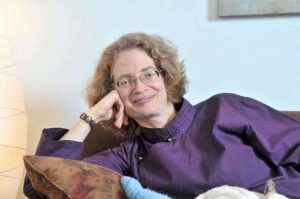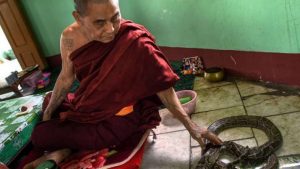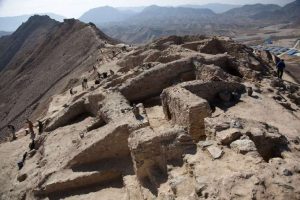Musican and activist Noa Zimmerman is a recent graduate of the University of Southern California’s Thornton School of Music, where she double majored in songwriting and music production and was the first female to graduate from the Music Production program. Noa devotes much of her time to music and giving songwriting lessons to underprivileged youth, as well as working as an advocate for climate justice. Noa founded Soundwaves: Marin City Youth Music Academy, a music program for students at Bayside Martin Luther King Elementary School, where arts programs were being cut due to lack of funding. In 2019, following a life-altering journey to India and Tibet, Noa began a therapeutic songwriting program for foster teenagers with addiction issues in Los Angeles. She also worked as videographer for a documentary on community organizing to prevent destructive and dangerous shallow oil drilling in Santa Maria. In 2020, Noa co-founded The Artivist Foundation, a non-profit dedicated to empowering artists and activists, and connecting them with local and global communities to fight for social, racial, environmental, and economic justice. She now serves as executive director of the organization.
A little over a month into my trip to India and Tibet, I was in a monastery at the base camp of Mount Everest attending a lecture on the Buddhist view of death, when my mind flashed with a realization that changed the way I look at the world. It makes sense that profound insights would reveal themselves at this location; there is something truly magical about being at Mount Everest. There’s a river that winds down from the mountain’s looming form that’s so pure, in my mind I call it the “definitive river of time.” You can climb down and walk along its banks while listening to the ringing of prayer wheels blown in endless circles by the wind. It feels like the rest of the world is flowing down from that point, in much more than a physical way.
The sky was completely clear for the days and night that we were there. There were little to no clouds blocking our view, which is almost unheard of at such a high elevation. At one point I played with two little boys who lived at the monastery. They were rolling coins down the road and chasing after them, and I wondered if they’d ever been anywhere else, or if they’d lived their whole lives in this spot with nothing else to compare. It’s the little details like these that led me to a realization that has influenced both my view of life and the creation of my song “Circle.”
During the lecture at the monastery on that day in late June 2019, I realized that while we each have our own karma, built up from uncountable past lives, our karma must also be completely intertwined with that of everyone and everything else, whether it’s a dog we adopt from a shelter, a person we smile to in passing on a street and never see again, a bee that stings us, or a person with whom we share our lives. Each living thing we come across has their own karmically fated interaction with everyone they encounter. And it goes on and on and on.
Not only as a species, but as beings within the entire living ecosystem of Earth, and maybe even other planes of existence, we’re all completely connected in one interdependent karmic web.
Two years later, I’m learning to take this concept to the next stage of thought and implementation. In meditations and conversations, I’ve reflected deeply on the role of free will and each individual’s responsibility (or lack thereof) to the vast network of sentient beings. It is fascinating to take my own personal views on activism in the context of relevant issues such as environmentalism, racial equality, and sexual assault, and then compare them with people looking at it through the lens of socially engaged Buddhism. The process of questioning what I see, hear, and read, and noting which aspects harmonize with my beliefs is inspiring and cathartic.
While writing “Circle” I was meditating on collective consciousness, which to me is the vibratory manifestation of our simultaneous awarenesses. In other words, at any given moment every living being is existing in the same realm at the same time, and therefore, despite the vast immediate differences of our individual contexts, there are certain planes of consciousness on which we’re all operating and by which we’re all subconsciously influenced. Regardless of whether anyone else believes in this nuanced expression of our connectedness, it ultimately comes down to the fact that we are all here at the same time just trying to enjoy our brief existence, so why do we destroy our world and abuse our fellow beings?
Although I had to forfeit some of the nuances of this thought in order to make the song accessible, I came up with the line: “When I dream of you / do you dream of me / or will the circle always be left incomplete?” As an opening, this is meant to express how fractured we are as a species and how this manifests on deep psychological levels. This line was also inspired by the Buddhist concept of anatman (Skt. non-self), or no soul. I wanted to express my belief that our division is born from the illusion that we are individuals, instead of a connected life force.
The second verse was also inspired by our illusion of individuality; how this has led us to create a society built on dividing constructs that infiltrate our consciousness and indoctrinate us from the time that we’re born, and how we often forget that all of our rules are manmade. I use the phrase “consciousness prisons” because I think this is what meditation is meant to free us from. Meditation is really a process of unlearning constructs so that we can return to our purest state, which some might call God—or, as it’s called in the Tao Te Ching, the Great Integrity. At the very least, hopefully, our meditation practice will cultivate calmness and compassion and allow us to move closer to a feeling of interconnectedness that’s beyond our conception of self.
The final verse of “Circle” comes back to the idea of the karmic web, but I wanted to express it in language that people are used to hearing so that it can still be impactful for those who might not be looking at the world from a Buddhist perspective. For this reason, I phrased our interconnectedness as love. I expressed it as questions because, although I have my theories, I don’t really know all the answers, and because I want people to really think about it and form their own conclusions. So I asked: “Why’s it so hard to love uncompromisingly / miles beyond reason, loudly or quietly / what are we protecting?”
Why are we so intent on the idea that our prosperity is dependent on converting or dominating others? Why is it so difficult to open ourselves up to everything and everyone else with unconditional loving-kindness? What are we scared we’ll lose if we do this? I might not have the answers, but I still wanted to conclude with my belief that the depth of love that can only be felt if we’re willing to be vulnerable is worth the risk. I don’t always practice this philosophy but I do aspire to it. I also believe that if we follow Buddhist principles, it’s not really a risk anyway. We open ourselves up to unconditional cosmic love without attachment, and with the full knowledge that it will pass. Once we overcome the fear of losing, we open ourselves up to love’s complete power and beauty.
The main issue I want to address in the video aspect of this piece is speciesism: the belief that humans are superior to other species and therefore entitled to exploit them. I think that respecting life in all forms is vital to the prosperity of our own species and our own spiritual journeys. I find it deeply concerning that even the kindest and most caring people I know are reluctant to educate themselves on the ways we abuse animals for food, clothing, and entertainment. They don’t want to be disturbed, and they know that if they do learn they’ll either have to give up burgers and leather shoes, or they’ll have to live with the guilt that they feel each time they put milk in their coffee or visit the zoo. The video speaks to this on a subtle level, but I hope it captures the depth and beauty of these beings and their place on Earth.
We’re all tied up in this karmic web, and each cycle of rebirth expresses itself specifically and intentionally. It could have been my karma to be a voiceless being behind that fence, but instead it’s my karma to be in a position of relative power. I have a voice and I even have the ability of creative expression in multiple mediums to reach people in a wide and hopefully impactful way. The limitations that I experience in my present incarnation still afford me much more free will than the cows, ducks, and horses that I came across while filming the video. Therefore, it’s my responsibility to advocate for their right not to suffer unnecessarily. I think this is ultimately the point of socially engaged Buddhism: karmic privilege means responsibility.
In one of my favorite quotes by the late musician George Harrison, he says: “I’ll tell you one thing for sure: once you get to the point where you’re actually doing things for truth’s sake, then nobody can ever touch you again because you’re harmonizing with a greater power.”
Building this song and video from the foundation of socially engaged Buddhism has helped me to stay anchored in truth, never straying from it in the pursuit of commercial appeal. That kind of authenticity is what makes me fall in love with pieces of art, and it’s how I always want to create mine. This is how I plan to be a socially engaged Buddhist and to make my little ripple effect within the vast interconnectedness of the karmic web.
See more
Related features from Buddhistdoor Global
The Tibetan “Songs of Realization”
Movement as a Framework for Reconciliation
Buddhist Kirtan: Interview with American Mantra Musician Lee Mirabai Harrington, Part One
The Growth of Wisdom and Compassion: An Interview with Drukmo Gyal Dakini, Part One
Related projects from Buddhistdoor Global















